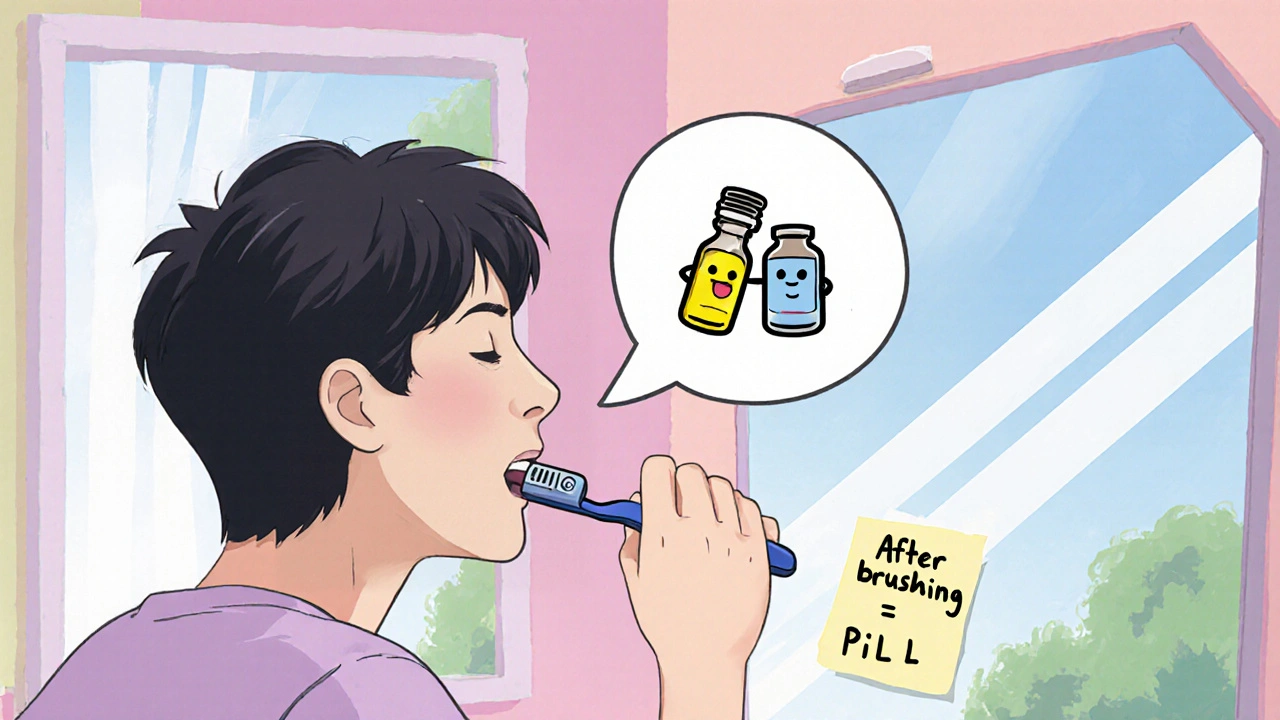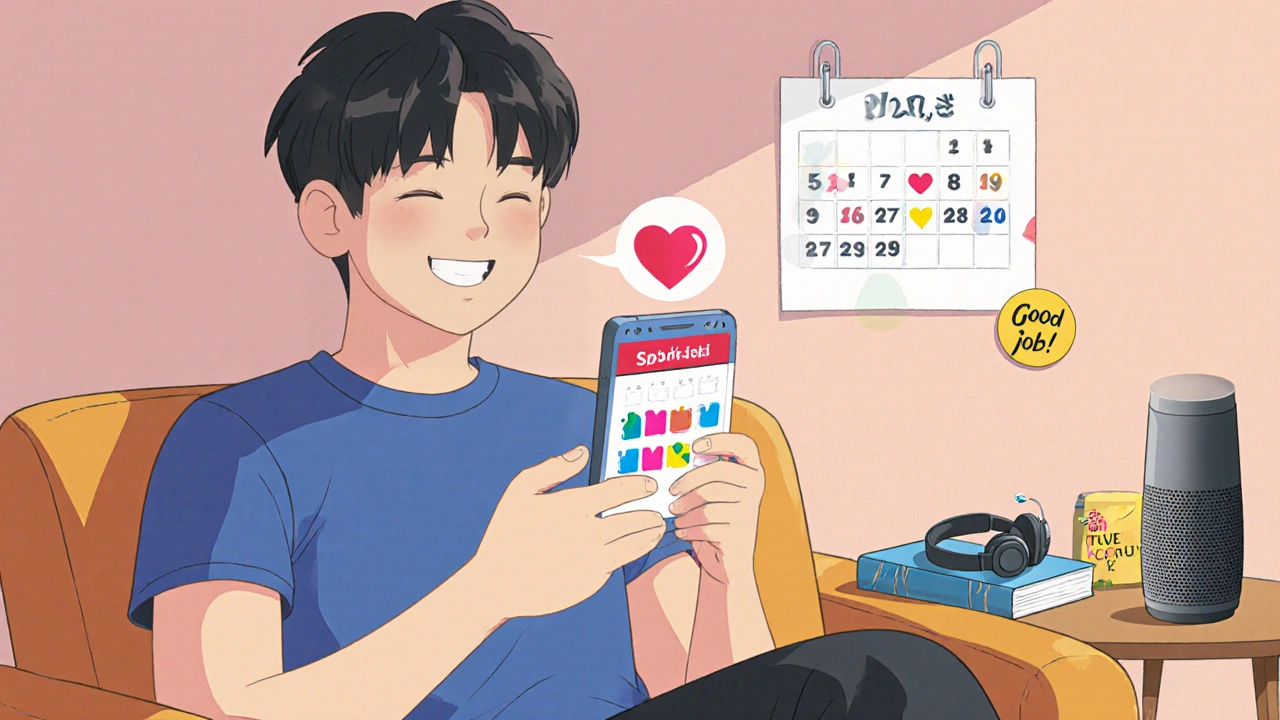How to Use Behavioral Tricks to Build a Medication Habit

Taking your medication every day shouldn’t feel like a chore. Yet for millions of people, it is. Whether it’s blood pressure pills, antidepressants, or insulin, missing doses isn’t just inconvenient-it’s dangerous. About half of people with chronic conditions don’t take their meds as prescribed. That’s not laziness. It’s not forgetfulness alone. It’s a system failure. The good news? You don’t need willpower to fix it. You need behavioral tricks.
Start with the simplest change: Tie it to something you already do
Your brain loves routines. It doesn’t care if you take your pill at 7 a.m. or 9 p.m.-it just wants to know when and how. The most effective trick? Anchor your medication to an existing habit. Brush your teeth every morning? Take your pill right after. Eat breakfast? Pop your pill with your coffee. This is called habit stacking, and it works because your brain links the new behavior to something automatic. A 2020 study in Patient Preference and Adherence found that people who tied their meds to daily routines improved adherence by 15.8%. Why? Because you don’t have to remember to take your pill-you just remember to brush your teeth. And you do that every day without thinking. Try this: Write down your current daily routine. Circle one activity you never skip. Now, put your pill bottle right next to it. Coffee maker? Toothbrush? Kitchen sink? That’s your new trigger. No alarms. No lists. Just action.Use a pill organizer-but only if it fits your life
Pill organizers are everywhere. But most people stop using them after a few weeks. Why? Because they’re not personalized. A box with seven compartments only helps if you take pills every day. If you take meds every other day? Or three times a week? You’ll end up confused. The key isn’t the organizer-it’s the system. A 2021 study in the Journal of the American Geriatrics Society showed that elderly patients using weekly pill boxes reduced missed doses by 27%. But here’s the catch: those who used them correctly. The ones who filled them once a week, at the same time, every Sunday, stuck with it. So if you’re going to use one, make it simple. Buy a 7-day box. Fill it on Sunday morning. Put it next to your toothbrush or coffee pot. Don’t overcomplicate it. And if you miss a day? Don’t panic. Just reset. No guilt. Just restart.Let your phone remind you-but make it smart
Smartphone reminders work. A 2021 meta-analysis in JMIR mHealth and uHealth found they boost adherence by nearly 29%. But generic alarms? They get ignored. You hear the beep, sigh, and hit snooze. What works better? Personalized, contextual reminders. Instead of “Take pill,” try “Take your blood pressure med after your morning shower.” Or “Take your antidepressant before your lunch break.” Add a photo of your pill bottle. Use a gentle chime, not a siren. And if you have a smart speaker, say: “Alexa, remind me to take my meds at 8 a.m.” Better yet, use an app that tracks your progress. Apps that show a calendar of filled days create a visual streak. Humans are wired to not break a streak. One app user told me: “I didn’t want to lose my 47-day streak. So I took my pill even when I was sick.” That’s the power of feedback.
Simplify your regimen
The more pills you take, the harder it is to remember. A 2011 meta-analysis of over 21,000 patients showed that switching from multiple pills to a single combined tablet increased adherence by 26%. That’s not magic. It’s math. Talk to your doctor. Ask: “Can I combine these?” “Is there a once-daily version?” “Are any of these optional?” Sometimes, a medication can be switched to a longer-acting form. Sometimes, two drugs can be merged into one pill. In some cases, a once-weekly injection replaces daily pills. Long-acting injectables (LAIs), for example, are used for schizophrenia and bipolar disorder. A 2022 study in Schizophrenia Bulletin found LAIs reduced non-adherence by 57% compared to oral meds. That’s not because patients suddenly became more responsible. It’s because the system was redesigned to work with human behavior, not against it.Use rewards-but not the kind you think
Rewards aren’t about candy or coffee. They’re about positive reinforcement tied to the behavior itself. The goal isn’t to bribe you. It’s to make taking your pill feel good. Try this: After you take your pill, pause for three seconds. Say out loud: “I’m doing this for me.” Or write it in a journal. Or give yourself a small, non-food reward-like 10 minutes of music, a walk around the block, or a deep breath. A 2022 study in Health Affairs found financial incentives improved adherence by 34% in low-income patients. But you don’t need cash. You can create your own reward system. Track your days on a calendar. Put a sticker on each day you take your meds. After seven days, treat yourself to something you enjoy. After 30 days? Maybe a new book, a movie night, or a massage. The trick? Make the reward immediate. Not “I’ll get a vacation if I take my meds for six months.” That’s too far away. Make it now.Build a support system
You don’t have to do this alone. A 2018 study in Patient Preference and Adherence showed that when doctors, pharmacists, and nurses all give the same message about taking meds, adherence jumps to 68%. That’s because consistency builds trust. Tell someone you trust-your partner, your sibling, your friend-that you’re working on building this habit. Ask them to check in once a week. Not to nag. Just to ask: “How’s your pill routine going?” If you’re on a chronic medication, ask your pharmacist about auto-refill programs. A 2022 study found these improved continuity by 33.4%. No more running out. No more last-minute pharmacy runs. Your meds arrive before you need them.
Address the hidden barriers
Sometimes, you skip pills because you’re scared. Or embarrassed. Or because the side effects feel worse than the disease. Maybe you think the meds aren’t working. Or you don’t believe you need them. This isn’t denial. It’s human. Motivational interviewing is a technique used by therapists and counselors to help people explore these feelings without judgment. You don’t need a therapist to try it yourself. Ask: “Why do I take this?” “What happens if I don’t?” “What would make it easier?” A 2020 review in Patient Education and Counseling found this approach improved adherence by 22.1%. It works because it turns resistance into understanding. You’re not fighting your brain-you’re listening to it.Be patient. Habits take time
No trick works overnight. The idea that habits form in 21 days? That’s a myth. Research shows it takes an average of 66 days for a behavior to become automatic. Some take longer. Some take less. It depends on the person, the pill, the routine. Don’t aim for perfection. Aim for consistency. Miss a day? That’s okay. Get back on track the next day. Don’t try to make up for it. Just reset. The goal isn’t to be flawless. It’s to build a system that works even when you’re tired, stressed, or distracted. That’s what behavioral tricks do. They don’t rely on motivation. They rely on design.What to do next
Pick one trick. Just one. Don’t try all of them at once. - If you forget often? Tie your pill to your morning coffee. - If you have too many pills? Ask your doctor about combining them. - If you’re unsure why you’re taking it? Write down your reason. - If you’re overwhelmed? Use a pill box and fill it once a week. - If you need a nudge? Set a phone reminder with a personal message. Do that for 30 days. Then check in. How many days did you take your meds? How did it feel? Did you notice a difference in your energy, mood, or health? This isn’t about discipline. It’s about design. Your body doesn’t need willpower. It needs a system that works with you, not against you.What if I forget my pill once in a while?
Missing a dose isn’t a failure-it’s data. Write down when and why you missed it. Was it because you were traveling? Busy? Afraid of side effects? Use that info to adjust your system. Maybe you need a pill box for travel. Or a reminder when you leave the house. The goal isn’t perfection. It’s learning how to adapt.
Can I stop taking my meds if I feel better?
Never stop without talking to your doctor. Many medications-like blood pressure or antidepressants-work to prevent problems, not just treat symptoms. Feeling better doesn’t mean the condition is gone. Stopping suddenly can cause rebound effects, worsen symptoms, or lead to hospitalization. If you’re thinking about stopping, talk to your provider. There may be safer alternatives or adjustments.
Are there apps that actually help with medication adherence?
Yes. Apps like Medisafe, MyTherapy, and Mango Health have been tested in clinical trials and shown to improve adherence by 20-30%. Look for ones that let you set custom reminders, track doses visually, and sync with your pharmacy. Avoid apps that just send generic alerts. The best ones let you add notes-like “took after breakfast” or “felt nauseous”-so you can spot patterns.
What if I can’t afford my meds?
Cost is the biggest reason people skip doses. Talk to your pharmacist-they can help you find patient assistance programs, generic versions, or discount cards. Some drug manufacturers offer free or low-cost meds to those who qualify. In Australia, the PBS (Pharmaceutical Benefits Scheme) caps prescription costs. Ask your doctor if your meds are on the PBS list. Never skip doses because of cost. There’s always a way to make it affordable.
Do behavioral tricks work for older adults or people with dementia?
Yes-and they’re often essential. For people with early-stage dementia, pairing meds with daily routines (like eating lunch) and using visual cues (like color-coded pill boxes) can boost adherence from 48% to 79%. Family members or caregivers can help by setting up the system and checking in gently. Simplicity is key: one pill, one time, one cue.
How long until I see results from better adherence?
It depends on the medication. Blood pressure meds may show lower readings in 2-4 weeks. Antidepressants can take 6-8 weeks. For chronic conditions like diabetes or heart disease, better adherence reduces hospital visits and complications over months and years. The biggest early win? You’ll feel more in control. Less stress. Less guilt. That’s a result too.

Emma Dovener
November 12, 2025 AT 18:19I started tying my antidepressants to brushing my teeth last month. Didn’t think it’d stick-but now I feel weird if I skip it. No alarms, no apps. Just toothpaste and pills. It’s weird how simple things work when you stop overthinking them.
Also, the pill organizer tip? I tried it once, filled it wrong, and gave up. Now I just use the original bottle next to my coffee maker. Works better.
Sue Haskett
November 13, 2025 AT 08:38I’m so glad someone finally said this: it’s not about willpower-it’s about design. I used to feel like a failure every time I missed a dose… until I stopped blaming myself and started redesigning my environment.
Now, my blood pressure pills sit right next to my shower caddy-I take them right after I get out. No thinking. No reminders. Just habit. And guess what? My numbers are better. Not because I’m ‘disciplined’-because I made it effortless.
Also, the ‘I’m doing this for me’ pause? I do that. It’s tiny. But it shifts something inside. Like… I’m not being punished. I’m choosing myself.
And yes, I know 66 days-not 21. I’ve been tracking mine since January. Still going. 73 days now. No streak broken. No guilt. Just progress.
Jauregui Goudy
November 14, 2025 AT 02:55Y’ALL. I WAS A DISASTER AT TAKING MEDS. Like, ‘forgot for three weeks and then panicked and took five at once’ disaster.
Then I tried the phone reminder trick-with a photo of my pill and the message: ‘Take this. You’re worth it.’
And guess what? I cried the first time I took it. Not because I was sad. Because someone-my phone-was finally talking to me like a human, not a robot.
Now I’ve got a 92-day streak. I took my pill while on a plane. In the hospital. Even when I had food poisoning. I didn’t want to break that streak. Not because I’m strong. Because someone-me-finally cared enough to make it easy.
Also, LAIs? My cousin’s on one for bipolar. Changed his life. No more daily chaos. Just a monthly shot. Why isn’t this the default??
STOP blaming people. START redesigning systems. We’re not lazy. We’re just not being helped right.
Tom Shepherd
November 14, 2025 AT 13:45the pill box thing didnt work for me cause i take meds every other day so i just use a calendar on my fridge with stickers. every time i take it i put a star. after 7 stars i get to watch a movie. its dumb but it works. also i typo a lot but i still take my meds.
also my doc said i could switch to a once a week pill. took me 6 months to ask. dont be scared to ask. they dont bite.
Rhiana Grob
November 15, 2025 AT 16:14This is one of the most thoughtful, practical pieces I’ve read on medication adherence. Too often, the conversation is framed around personal failure, when the real issue is systemic design. The behavioral science here is sound-and the emphasis on reducing cognitive load is critical.
I’ve worked with elderly patients who benefit immensely from routine anchoring and visual cues. Color-coded pill containers, consistent timing tied to meals, and caregiver check-ins are low-cost, high-impact interventions.
Also, the point about rewards being immediate? Absolutely vital. Delayed gratification doesn’t work when someone is managing chronic pain, fatigue, or depression. The reward must be woven into the moment-whether it’s a deep breath, a favorite song, or simply acknowledging, ‘I did that.’
Thank you for framing this not as a moral issue, but as an engineering problem. We don’t need more discipline. We need better systems.
Allison Turner
November 16, 2025 AT 11:31Wow. So you just want people to put their pills next to their toothbrush and call it a day? No wonder so many people die from preventable causes. This is like telling someone with diabetes to just eat less sugar and they’ll be fine.
Most of these ‘tricks’ only work if you’re already stable, employed, and have a brain that isn’t fogged out by meds or depression. What about people who can’t afford the pills? Who don’t have a toothbrush? Who don’t have a routine because they’re working three jobs and sleeping in their car?
This reads like a BuzzFeed list written by someone who’s never missed a dose in their life. It’s condescending. And it ignores the real barriers: cost, access, mental health, trauma. Not ‘habit stacking.’
Also, 66 days? That’s a myth too. Some people need years. And some never get there. And you’re not helping by pretending it’s just about stickers and coffee.